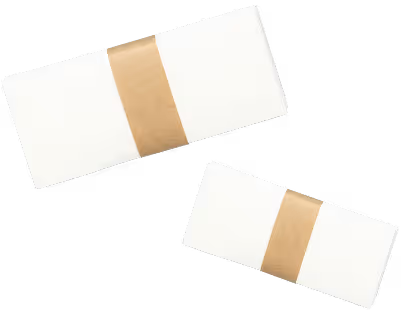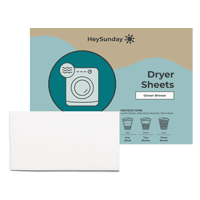
Best Laundry Detergent for Sensitive Skin: What to Look For
If you’ve ever pulled on a “freshly cleaned” shirt only to feel your skin start itching within minutes, you know how frustrating laundry-related irritation can be. For people with sensitive skin, laundry day isn’t just about clean clothes. It’s about comfort and peace of mind. The problem is that many conventional detergents contain hidden irritants like fragrances, dyes, and harsh chemicals that stay behind on your clothes long after the wash cycle ends.
The good news? With a little know-how, you can take control of your laundry routine and protect your skin. In this guide, we’ll walk through why some detergents cause irritation, which ingredients to avoid, what to look for in a sensitive-skin formula, and a few smart laundry habits that can make a world of difference for you and your family.
Why Some Detergents Irritate Sensitive Skin
You might be wondering: if detergent is supposed to clean clothes, why does it sometimes make skin worse? The answer lies in the additives.
Fragrances are one of the biggest culprits.
Most detergents are loaded with perfume-like chemical blends that cling to fabrics so clothes smell fresh. But these scents aren’t just fleeting whiffs of lavender or ocean breeze. They’re complex chemical cocktails that can linger in fabric fibers and transfer onto your skin all day long. If you’ve ever gotten a rash after wearing a freshly washed T-shirt, fragrance may be to blame.
Dyes and optical brighteners are another source of irritation.
These additives don’t actually make your clothes cleaner. They just make whites appear whiter and colors look brighter. These unnecessary chemical ingredients can inflame sensitive skin, especially in areas where clothes fit tightly, like waistbands or collars.
Harsh surfactants can strip natural oils.
Then there are harsh surfactants, like sulfates, that create all that satisfying foam in the wash. While they’re great at cutting grease, they can also strip your skin of its natural protective oils, leaving it dry, itchy, and more prone to flare-ups.
Beware of residue build-up.
Finally, there’s the issue of residue build-up. Using too much detergent or choosing one that doesn’t rinse clean can leave a film on clothes that rubs against your skin all day. Think of it as carrying around a layer of chemicals every time you get dressed.
In fact, dermatologists estimate that contact dermatitis, or skin irritation triggered by outside substances, affects up to 20% of people at some point in their lives. Laundry products are one of the common triggers.
Ingredients to Avoid in Laundry Detergent
When your skin feels itchy or irritated after wearing clean clothes, it often comes down to what’s hiding in your detergent. The labels can be confusing, filled with long chemical names and vague claims like “dermatologist approved.” But if you know which ingredients are most likely to cause trouble, you’ll have a much easier time picking a detergent that works for you.
Here are the top offenders and why they matter:
- Synthetic Fragrances and Parfum: These are catch-all terms for dozens of chemicals that don’t need to be listed individually. They make clothes smell fresh, but they’re also one of the leading triggers of allergic skin reactions.
- Artificial Dyes and Colorants: These add color to the detergent itself, not your clothes. They’re cosmetic, not functional, and can cause redness or hives in sensitive skin.
- Optical Brighteners: These are coatings designed to make whites look brighter under UV light. They stick to fabrics and can cause flare-ups, especially for eczema-prone skin.
- Sulfates (like SLS and SLES): Popular because they foam well, but they strip natural oils from both fabric and skin, leaving things dry and tight.
- Formaldehyde-Releasing Preservatives: Ingredients like DMDM hydantoin slowly release formaldehyde to extend shelf life. Unfortunately, they’re also linked to skin irritation.
- Certain Enzymes: Enzymes help break down food and protein stains, but they can be too aggressive for people with eczema or very reactive skin.
The bottom line? If a detergent’s label feels more like a science experiment than a cleaning product, it may be worth skipping. Your skin will thank you.
Detergent Ingredients That Are Better for Sensitive Skin
On the flip side, there are ingredients and formulas that can make laundry safer and gentler. These are the ones to look for when you’re scanning shelves or reading labels online.
Plant-based surfactants are one of the best options
Unlike other harsh chemical surfactants, plant-based surfactants come from renewable sources like coconut or corn and are much gentler than harsh petrochemical detergents. They’ll still get your clothes clean but without stripping your skin in the process.
Biodegradable, minimal formulas are a win
The fewer additives in your laundry detergent, the fewer chances for skin irritation. Look for detergents that emphasize short, simple ingredient lists.
Fragrance free detergents are a game-changer.
Without heavy perfumes, your clothes come out clean, not scented. Ditching the chemical scents can be especially helpful for babies, seniors, or anyone with eczema or allergies.
Look for certifications
And while no detergent can promise to be completely irritation-free for every single person, certifications like dermatologist-tested or eczema-friendly can offer extra reassurance that a product has been carefully evaluated for sensitive skin.
Types of Laundry Detergents for Sensitive Skin
Not all detergent formats are created equal, and the type you choose can affect how your skin feels.
Liquid detergents are the most common option, but they usually come in heavy plastic jugs that are awkward to pour and easy to overuse. If you don’t measure carefully, it’s easy to leave residue on your clothes.
Powders feel old-school, and while they can be cost-effective, they often contain fillers. They’re also messy, and if not stored properly, they clump up.
Pods or packs are convenient, but many come wrapped in film that doesn’t always fully dissolve. Leftover film on clothes can be especially irritating to sensitive skin.
Detergent sheets or strips, like HeySunday’s laundry detergent sheets, are an excellent option for sensitive households. They’re pre-measured, so you never risk using too much, they dissolve completely in hot or cold water and they’re plant-based, fragrance free, and packaged plastic-free. Plus, they’re light and easy to store, a bonus for busy families with limited cabinet space.
Traditional vs. Sensitive-Skin vs. Eco-Friendly Detergents
It can feel overwhelming to stand in the laundry aisle staring at dozens of bottles and boxes. Some say “free & clear,” others promise “whiter whites,” and a handful call themselves eco-friendly. But what do those labels actually mean if you have sensitive skin?
To make things easier, here’s a side-by-side look at how traditional, sensitive-skin, and eco-friendly detergents stack up. Think of this as your cheat sheet before you buy:
While “sensitive-skin” formulas are definitely a step up from conventional detergents, they still come with some drawbacks, especially the bulky plastic packaging and occasional inconsistencies in ingredients. Eco-friendly detergent sheets combine the best of both worlds: gentle on skin and gentle on the planet.
Tips to Reduce Laundry-Related Skin Irritation
Picking the right detergent is the first step, but how you do laundry matters just as much. Small changes in your routine can make a huge difference for sensitive skin. Here are some tips:
Use less detergent than the label recommends
Most of us overpour, which means more residue left behind on clothes. Cutting your detergent dose down is often enough to get things clean while keeping fabrics gentler. If you want to ditch the hassle of laundry dosing altogether, pre-measured laundry detergent sheets are your best bet!
Use extra rinse cycles
Running an extra rinse cycle can also help, especially for bedding, underwear, or baby clothes. It takes just a few minutes longer, but it helps flush away leftover detergent that can cause irritation.
Wash clothes in cold or lukewarm water
Washing in cold or lukewarm water is another simple swap. It’s easier on both fabrics and skin, and it reduces the chances of harsh chemical residues sticking around. Plus, it’s a win for the environment.
Ditch the add-ins
Fragranced fabric softeners and harsh dryer sheets are a common skin irritant trigger too. Swap them out for gentler fragrance free dryer sheets or wool dryer balls.
Clean your washing machine
And don’t forget about your washing machine itself. Over time, detergent, fabric softener, and hard-water minerals build up inside. Running a monthly cleaning cycle with vinegar or baking soda keeps it fresh and prevents old residue from landing back on your clothes.
These small adjustments, combined with a skin-safe detergent, can make a noticeable difference in how your clothes feel against your skin.
Special Considerations for Families with Sensitive Skin
If you’re shopping for more than just yourself, it helps to think about the unique needs of everyone in your home.
Babies and young children have thinner skin that absorbs chemicals more easily. That’s why fragrance free, hypoallergenic detergents are especially important for them, and why double rinses are often worth the extra time.
Seniors tend to have drier, more fragile skin, which makes them more susceptible to irritation. Sticking to gentle formulas and natural fabrics can help reduce discomfort.
And if you live in a household with eczema or allergy-prone members, consistency is key. Using the same fragrance free detergent across all laundry loads, instead of mixing brands or formulas, helps reduce the risk of flare-ups.
FAQs About Sensitive Skin and Laundry
Is “hypoallergenic” regulated?
No. It’s a marketing term. Always read the ingredient list instead of relying solely on the label.
Can sensitive-skin detergent still tackle tough stains?
Yes. Pretreating helps, but many plant-based detergents are surprisingly effective without the harsh additives.
Do I need to rinse everything twice?
Not always. Everyday clothes usually don’t need it, but items that touch skin directly, like sheets, towels, or underwear, often benefit from an extra rinse.
Is eco-friendly always better for sensitive skin?
Often yes, since eco-friendly brands tend to skip dyes and fragrances. But it’s always best to double-check formulas.
Conclusion
Laundry irritation isn’t inevitable. By choosing a fragrance-free, dye-free, plant-based detergent and adopting a few simple laundry habits, you can protect your skin and make laundry day a little less stressful.
If you’re looking for a detergent that’s gentle on sensitive skin and easy on the planet, HeySunday’s laundry detergent sheets are a simple, eco-friendly swap. They’re fragrance free, dye-free, and designed to keep your laundry routine as mess-free as it is skin-friendly.
Because at the end of the day, clean laundry should make you feel good, not itchy.














“My sheets have never felt cleaner. I’m hooked.”
“Finally — detergent that actually works and doesn’t take up half the shelf.”
“Hey Sunday WORKS. Great for stains, and no buildup in the washer.”
“We switched from liquid. The scent is amazing and it saves us money.”
“I’ve got total control with HeySunday. I’ll never go back to powder.”